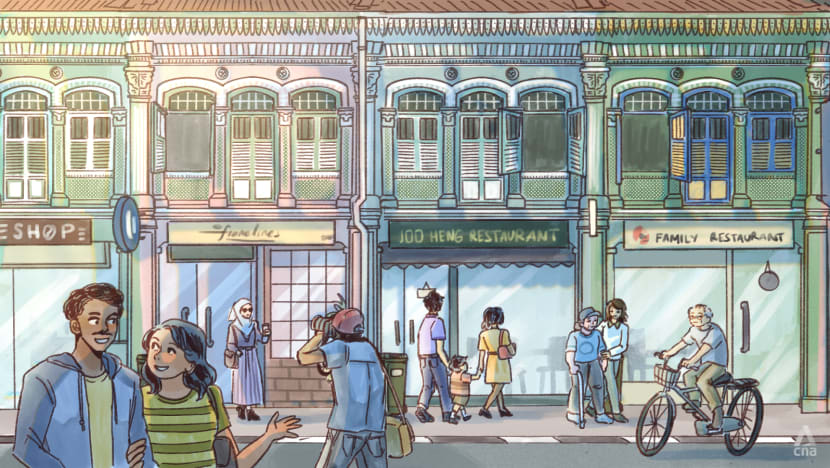‘Heritage business requires continuity’, says third-generation rice dumpling business owner
Singapore’s heritage has been in the spotlight following the closure and impending closure of shops that have been mainstays in Holland Village.

Heritage businesses depend on the strength and unity of the family, says one third-generation owner. (Illustration: CNA/Clara Ho)

This audio is generated by an AI tool.
SINGAPORE: When his family’s Nyonya rice dumpling business was struggling in the face of a manpower crunch, bird flu and swine flu, Mr Edmond Wong and his siblings decided to come together to save it.
Today, they are the third-generation owners of Kim Choo Kueh Chang, which was started by their grandmother Lee Kim Choo in 1945. They take pride in carrying on the Peranakan heritage.
“If we don't come back (to the business), I guess it's not just our childhood memories - someone else's childhood memories will (also) be gone. So we all decided to come back to help with the family business,” Mr Wong told CNA podcast Deep Dive.
As far as Mr Wong is concerned, heritage businesses depend on the strength and unity of the family.
“A heritage business requires continuity,” said Mr Wong.
“The gotong-royong spirit must be there. When we're talking about heritage business, we must look into the values and the traditions,” he added.
KEEPING HERITAGE BUSINESSES GOING
Singapore’s heritage has been in the spotlight following the closure and impending closure of shops that have been mainstays in Holland Village.
For heritage businesses to keep going, they need to transform, said Singapore University of Social Sciences' Dr Lye Kit Ying, whose research interests include cultural heritage.
“Our lifestyle practices, even our cultural practices evolve with (the) times. You can't expect people to just keep following something that was done centuries ago,” she said. However, the wider community may have a part to play, she noted.
Instead of waiting for landlords to lower the rent so these businesses can afford to continue or waiting for the government to declare them as part of Singapore’s heritage, the community can come together to help them transform or find solutions, she said.
“Then, in a way, everybody gets to be part of this process. I think it can make it more sustainable,” added Dr Lye.
Mr Wong said that his family’s way of keeping the business going included going beyond being just a retail front.
“We promote the Peranakan heritage. There are a few things that we do as a front to promote Katong and Joo Chiat as a community. So, it's no longer just our business alone. We are in a business to promote heritage and culture,” he said.
The firm also started employing persons with disabilities – something he took about seven years to convince his family about. They also tapped the government’s productivity grant which allowed them to employ more persons with disabilities.

PASSING THE BATON ON
Dr Lye said keeping heritage businesses part of Singapore’s landscape will require the younger generation to be more involved.
“Whatever loss we are feeling, and whatever loss our parents’ or grandparents’ generation felt earlier, it’s the same thing. It's always (people) one generation ago (thinking), ‘I don't see the connection here’,” she said.
“But if you want heritage to be conserved, and to have longevity and sustainability, you need the younger generation to buy in as well, because they are the ones who are carrying the baton longer.”
Mr Wong echoed her sentiment, adding that older generations may not have a successive generation that can continue their work. He said that they may also struggle to make their presence felt as they compete with ever-changing industries and technology.
However, losing such businesses could lead to people losing their sense of belonging, he believes.
He appealed to second- or third-generation business owners: “Encourage your children or the next generation to take (up) the baton. I think a lot of changes will not be comfortable.
“It took me many years to convince my parents that things ought to change a certain way. So did my brothers, my siblings, but change will have to happen. If not, our heritage will be gone.”
















